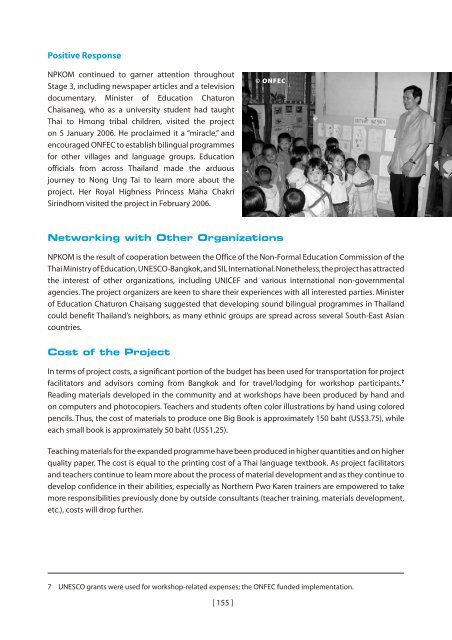Mother Tongue-based Literacy Programmes: Case Studies of Good ...
Mother Tongue-based Literacy Programmes: Case Studies of Good ...
Mother Tongue-based Literacy Programmes: Case Studies of Good ...
You also want an ePaper? Increase the reach of your titles
YUMPU automatically turns print PDFs into web optimized ePapers that Google loves.
Positive ResponseNPKOM continued to garner attention throughoutStage 3, including newspaper articles and a televisiondocumentary. Minister <strong>of</strong> Education ChaturonChaisaneg, who as a university student had taughtThai to Hmong tribal children, visited the projecton 5 January 2006. He proclaimed it a “miracle,” andencouraged ONFEC to establish bilingual programmesfor other villages and language groups. Education<strong>of</strong>ficials from across Thailand made the arduousjourney to Nong Ung Tai to learn more about theproject. Her Royal Highness Princess Maha ChakriSirindhorn visited the project in February 2006.© ONFECNetworking with Other OrganizationsNPKOM is the result <strong>of</strong> cooperation between the Office <strong>of</strong> the Non-Formal Education Commission <strong>of</strong> theThai Ministry <strong>of</strong> Education, UNESCO-Bangkok, and SIL International. Nonetheless, the project has attractedthe interest <strong>of</strong> other organizations, including UNICEF and various international non-governmentalagencies. The project organizers are keen to share their experiences with all interested parties. Minister<strong>of</strong> Education Chaturon Chaisang suggested that developing sound bilingual programmes in Thailandcould benefit Thailand’s neighbors, as many ethnic groups are spread across several South-East Asiancountries.Cost <strong>of</strong> the ProjectIn terms <strong>of</strong> project costs, a significant portion <strong>of</strong> the budget has been used for transportation for projectfacilitators and advisors coming from Bangkok and for travel/lodging for workshop participants. 7Reading materials developed in the community and at workshops have been produced by hand andon computers and photocopiers. Teachers and students <strong>of</strong>ten color illustrations by hand using coloredpencils. Thus, the cost <strong>of</strong> materials to produce one Big Book is approximately 150 baht (US$3.75), whileeach small book is approximately 50 baht (US$1.25).Teaching materials for the expanded programme have been produced in higher quantities and on higherquality paper. The cost is equal to the printing cost <strong>of</strong> a Thai language textbook. As project facilitatorsand teachers continue to learn more about the process <strong>of</strong> material development and as they continue todevelop confidence in their abilities, especially as Northern Pwo Karen trainers are empowered to takemore responsibilities previously done by outside consultants (teacher training, materials development,etc.), costs will drop further.7 UNESCO grants were used for workshop-related expenses; the ONFEC funded implementation.[ 155 ]

















